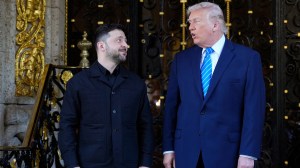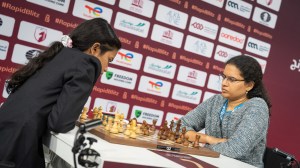The ghost of 8217;74
Everyone is focused on how important nuclear energy is going to be in the future and that8217;s the stated reason why we need the agreements with the United States...

Everyone is focused on how important nuclear energy is going to be in the future and that8217;s the stated reason why we need the agreements with the United States, the IAEA and the NSG. While this is doubtless important, this is not the only gain and in a near-term perspective other gains may outweigh the nuclear energy part of the deal.
One item that just does not get sufficient attention is the 8220;scientific and technological apartheid8221; that India has been subject to since 1974. The non-proliferation zealots in the US came up with an absolutely ingenious way to 8220;punish8221; India and its impertinent leader Indira Gandhi for having had the temerity to explode a bomb which the Chinese had quietly exploded 14 years earlier. The mandarins of Washington, DC came up with a theory that not only should export of nuclear reactors or uranium or heavy water plants or nuclear turbines to India be banned, but innumerable other devices, instruments, machines, designs, drawings, software that had nothing remotely to do with nuclear energy should also be banned. The convoluted logic used was that a switch or a circuit board that may be used in a medical monitor, a large computer, a satellite launcher or a weather-tracking instrument could theoretically have a 8220;dual8221; use. It could apparently, by some stretch of the imagination, be used in 8220;directly or indirectly8221; supporting the development of a nuclear device.
Hence all of these arbitrarily classified 8220;dual-use items8221; were also banned for export to India. Even something as basic as software encryption was considered a sacred item to be kept away from us. This disastrous development has set back Indian science and technology considerably in all sorts of areas 8212; communications, medical technology, advanced computing8230; you name it.
While it is not the only reason, it is definitely an important factor in India8217;s failure to become a major electronics hardware producer like South Korea or Taiwan. To add insult to injury, the US passed laws that effectively arm-twisted others the United Kingdom, France, Russia, Japan from also supplying us with any of these mysterious 8220;dual-use8221; technologies.
The Chinese continued to get access to Soviet developments for a long time which they successfully leveraged. And, after last year, when they have signed their own 123 with the US, they are sitting quite pretty. Ironically, since Pakistan did not explode a bomb in 1974, it escaped these rigorous restrictions. We were not so lucky. President Carter talked insultingly and condescendingly to our Prime Minister Morarji Desai. For the benefit of historians, these brusque expressions have been captured on a recorder. Until the intrepid Senator Pressler came along and insisted on Pakistan coming up on the radar screen not only as bomb-makers but also as bomb proliferators, our unpredictable neighbours got a free ride. Despite the senator8217;s persistent efforts, many pro-Pakistani denizens of the State Department kept insisting that Pakistan had no nuclear ambitions. They had to eat their words in 1998. But that8217;s small comfort for us.
We used to very occasionally get 8220;exemption certificates8221; for dual-use exports as if these were great favours being bestowed on us. To get one exemption certificate needed sign-offs from a dozen departments and agencies in Washington, DC and trust me bureaucratic signatures are as difficult to get out there as they are in the corridors of New Delhi. And usually, by the time these exemption certificates came through, the exporter and the importer had lost interest. Business has to move on and cannot wait for the linguistic quibblers to decide what is dual or for that matter single use!
It is to the credit of the Bush administration that they have ensured, as part of the nuclear cooperation deal, that the patently untenable embargo on dual-use technologies is ended. This gives our scientists access to cutting-edge world-class technologies in a variety of spheres and will ensure that India makes its deserved contribution to the further development of knowledge in these areas. I suspect that more than anything else the US establishment realised that restricting access of key research to Indian scientists might in fact hurt efforts of all scientists around the world. So despite there remaining irrational non-proliferation advocates in Washington, DC who want to continue to 8220;hurt8221; India for the temerity of 1974, better sense has prevailed. They have also noted that India has been a scrupulous non-proliferator, something which can hardly be said about our neighbour to the west. They did not blast a bomb like we did in 1974, but for four decades now, they have been busy buying and selling nuclear and missile hardware and software in markets that can be characterised as white, black, grey, red and positively dangerous. Clearly, the members of the 8220;punish India8221; school lost ground and the members of the 8220;let8217;s deal sensibly with India and leverage India8217;s Talent Base8221; school has prevailed.
As a betting man, I would take the position that the single biggest short and medium term gain for India is entry back into the halls of legitimate scientific and technological research in areas where we quite frankly are pretty good. It will take three five? years to get environmental clearance to agree on a site for a nuclear power plant; it will take three to five more years to build and commission a reactor. It would be safe to assume that new nuclear power generation is at least seven years away after the date all agreements are completed. 8220;Dual-use8221; technologies are another matter. I see immediate benefits in building larger computers, in improving communication devices, in oil and gas exploration, in mineral extraction and so many other areas.
So the next time you meet your financial advisor and he or she is pushing nuclear power stocks, please do make the point that while that looks like a good seven-year bet, there might be more short-term returns in many of these lesser-known but very valuable dual-use plays. And remember you picked this up from this column!
The writer divides his time between Mumbai and Bangalore jerry.raoexpressindia.com
- 01
- 02
- 03
- 04
- 05































